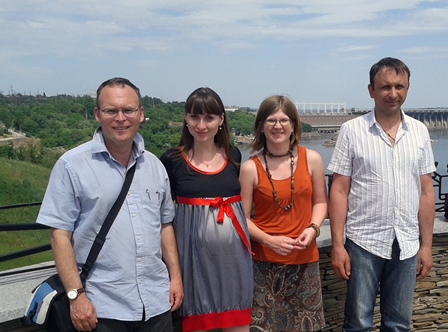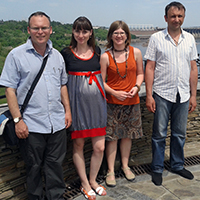Kiron Reid (left), here with colleagues by the Cossack Dam, is an honorary research fellow in the University’s School of Law
“As part of a team of 90 UK short term election observers, I was deployed to the Organization for Security and Co-Operation in Europe (OSCE) election observation mission in Ukraine for the presidential election.
The British Foreign Office sent ten long term observers and 90 short term observers to support the 900-strong Organisation for Security and Cooperation in Europe, Office for Democratic Institutions and Human Rights (ODIHR) election mission in Ukraine. After briefing in Kiev we flew down via Dniepropetrovsk to Zaporizhia, which is in the South East but is not an area where there has been any major trouble.
Prosperous
Zaporizhia looks like quite a prosperous city. There is a lot of heavy industry and parts are still very industrial and functioning. There are modern giant shopping malls, nice coffee shops, and many bars and restaurants. There are three universities plus a medical school.
This is a city that is both definitely Ukrainian, but also very specifically and clearly ‘a Soviet city’. The main boulevard is Lenina Prospect, and our district is Leninskya.
Lenin has pride of place on a huge statue at the end of his boulevard overlooking the majestic river and the mighty hydro-electric dam.
With my Czech colleague I was jointly responsible for a city district (rayon) of 80 polling stations and 161,000 people. We visited 15 of them and saw no significant irregularity. The election and counting process was really quite smooth, but completing the paperwork afterwards was interminably slow.
People turned out in blazing sun in the morning to vote, and there was a party atmosphere – with rock and folk music playing at the polling stations (everyone asked me about the Beatles), and catering in the foyers.
The ‘tabulation’ of local counts took all night, so we were relieved at 1am and started another shift at 8am.
Fifty percent of the residents voted. They wanted, and got, a clear winner so that they could show the outside world that Ukraine has a genuinely democratically elected president.
Met international standards
But most of all people were enjoying summer and were out in the streets, the coffee shops, at the beach or beach bars along the river below the dam, in the parks, or the national park.
International election observers have declared that the election largely met national and international standards, except in Donetsk and Luhansk where very few citizens were able to vote.
Billionaire, Petro Poroshenko was overwhelmingly elected President by people in nearly 90% of the country.
The people want to live their lives as modern Europeans who are Ukrainian but also friends with Russia. I hope they will be allowed to do so, and I’d love to visit Ukraine again.”

